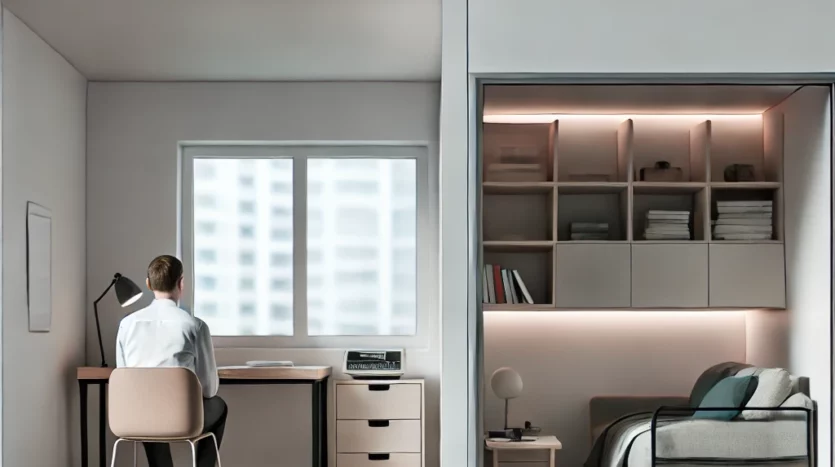Is it possible to live in a non-residential unit?
Under current regulations, a person living in a non-residential room may pay a fine. So how do you legalize a change in the nature of use of a non-residential building?
Changing the use of a building room without proper notification to the authority is a violation of the construction law. And this is true even when the non-residential room is adequately equipped, which allows for comfortable housekeeping and does not require major interference with the building and architectural or sanitary transformations.
Apartment vs. non-residential building – differences
At the outset, it is worth mentioning what the difference between an apartment and a commercial premises is. A non-residential premises is a room or several non-residential rooms, isolated by walls made of durable materials, in which service, commercial or storage activities are most often carried out. It does not constitute a room of a technical, economic or residential nature.
An apartment is one or more rooms, isolated by walls, made of durable materials, located within a single building, have a separate entrance, in which a group of people live who share a common household.
Basement, garage, attic belong to both non-residential and residential premises.
The two terms are very similar. A utility room and an apartment differ in terms of the purpose for which they are used. The dwelling and non-residential premises in accordance with the relevant regulation should comply with the established technical conditions.
How to convert a utility room into an apartment?
The indicated differences between an apartment and a utility room force the following question: do I have the right to live in a utility room? The Law of July Seventh, 1994 regulates the change of use of a room or non-residential building, which involves a complete change in the nature of the use of the building and the conditions: work, load size, fire protection, health, hygiene and sanitary conditions. Where to start? First, changing the nature of the use of the building room, and then recognizing that the nature of the use of the facility has indeed been changed. Conversion of a commercial space to a residential unit or an apartment to a non-residential unit is the result of a decision to change the nature of the use of the premises or building.
Then, when there is a need to determine whether there has actually been a change in the use of a building room, there is a comparison between the previous use of the building room and the current nature of the use of the service room.
Where do I report my intention to change my use?
A person who intends to change the use of a non-residential room or building should report it to the relevant authority. We report no intention to make alterations of an architectural or sanitary nature. In the application, we declare our desire to change the use of the non-residential building, presenting for inspection by the building supervisor the previous nature of the use of the premises and the planned changes.
What is the penalty for failing to report a change of use of a non-residential premises?
Before you decide to change the nature of the use of the building, it is essential that you file the appropriate declaration with the authorities. If you report changes after they have already been made, then such a statement is ineffective. At this point, the following question arises: who, then, should report the change in the nature of use of the premises? The owner or manages the property, as they are the people responsible for the proper use of the property. Inspectors of the WINB or PINB are investigating the illegal change of use of the building.
In the case where even the room did not need renovation, and the interior, as well as the sanitary facilities, made it possible to immediately convert a non-residential room into a dwelling, the owner may be liable for the fact that, without permission, he arbitrarily changed the use of the premises. If the nb (building supervisory authority) finds that there has been an unlawful change in the nature of the use of the building, then it can demand the submission of relevant documents and stop the use of the building part.
After the deadline for submission of documents, the nb will check whether the owner has performed all the requirements. If the building object is still being used for purposes other than the original, it will issue a decision to restore the legal use of the building part.
Step by step on how to legalize a dwelling
After the owner or manager of the property provides all the necessary documents, then the relevant nb authority will determine the amount of the legalization fee. The investor can file a complaint with either the WINB or (if the WINB issued a ruling in the first instance) the GINB. If the fee is not paid within the prescribed period (seven days), it is subject to collection in accordance with the procedure specified for enforcement costs in administration. The power to collect the fee is vested in the governor.
WHY YOU NEED TO KNOW
Fine for unlawful change of nature of use of building part
Keep in mind that if you have even paid the legalization fee, you may have to pay a fine for the offense of arbitrary change of use of the premises. The GINB can impose a fine of up to 2,000 zlotys. Every citizen has the right not to accept the fine, but in such a case the relevant nb authority can file a lawsuit in court for punishment, which it can also direct when the fine is not paid on time.











